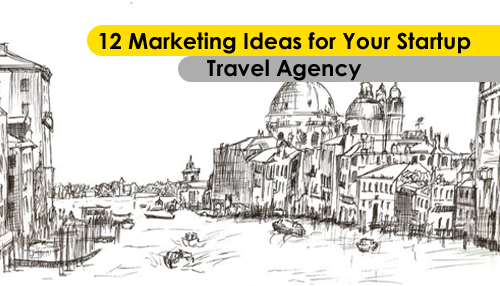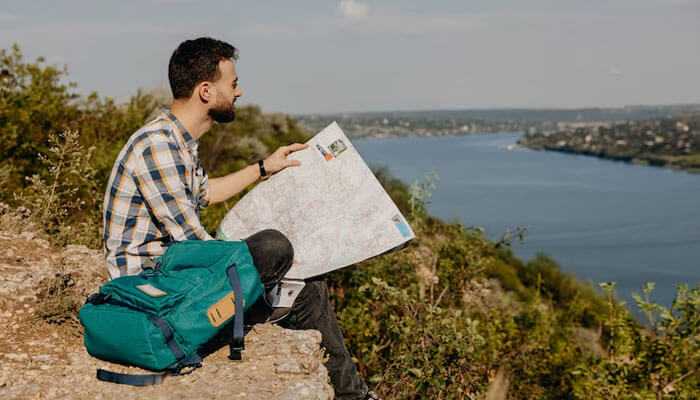Launching a startup travel agency presents an exciting opportunity to tap into the ever-growing tourism industry and cater to wanderlust-driven consumers. Travel marketing takes time and strategy. If you’re not satisfied with you’re finding it hard to compete online, or you’re not satisfied with your search ranking, conversion rate or ROI then it’s time to take it all back to basics. Start with the foundations…
1. First, understand your customer personas
How can you put a marketing strategy in place if you don’t truly understand your buyer personas?
Yes, their demographic information is important, but beyond that, you need to ask yourself what drives them when researching, planning, and booking. What motivates them to travel? What frustrates them? Where do they find their information? Xtensio has a great free tool that will guide you through this process.
Define your top 3 personas and build your website and marketing campaigns around them.
2. Also, take a good look at your website
Your website should be the cornerstone of your marketing efforts. Most agencies and tour companies have a website, though quality and usability vary wildly.
We see sleek and contemporary sites that may not rank well in search engines, while others have poorly designed sites that are not user-friendly or content-rich. In both instances, the business is most definitely missing out on leads! Sound familiar?
There are a few basic things you can do to address this:
a. Think responsive.
We can no longer ignore the use of mobile devices when building or re-developing a website. Up to 50% of your visitors are likely to be accessing your site from a mobile device. How frustrated will they be if they have to pinch and zoom their way around?
b. Track your visitors.
Set up and manage Google Analytics for your site. It’s vital. The data you can collect will tell you so much about user behavior – how they found your site, what pages they visited, where they left off, how long they stayed and so much more. This data will be invaluable to your marketing efforts. If you’re not comfortable in this space then find someone who is.
c. Simplify design.
The most successful online brands favor minimal website design that makes finding information easy. Does your site capture who you are as a brand and is it user-friendly? Is there enough content and a strong enough call-to-action to convert visitors into sales? User testing is a good way to test your content and visitor expectations for everyday web users.
d. Start testing.
Is your website doing what you expect of it? Do you understand what a 5% increase in site conversion will mean to your bottom line? Such an increase is achievable if you stop guessing and start using conversion testing software like Optimizely.
e. Tie marketing efforts back to your site.
Entice visitors to sign up to your newsletter when browsing your site and linking newsletter content back to your site. The same goes for social media posts, blog posts, campaigns…everything!
f. Update regularly.
Search engines love fresh content, so keeping it updated and relevant can drive your organic search engine ranking up. Assign a staff member to update the site regularly because a little effort will go a long way
3. Next, Understand micro-moments in travel
Your marketing strategy should be capitalizing on ‘micro-moments.’
They’re those moments when you DO SOMETHING; the moments when you turn to your phone or other devices to watch, discover, research or buy something. These are the moments that shape you thinking and the moments when decisions are made. These include:
1. I want to get away: Dreaming moments
2. I want this trip to be perfect: Planning moments
3. I want to book it: Booking moments
4. I want to make the most of it: Experiencing moments
Understanding that these are critical moments in the customer journey will help you to be present when your customer needs you to be.
4. Social media – get it right.
Social media can be a cost-effective channel for startup travel agency. Choosing the right platform is important but putting a strategy in place is even more important. Consider your objectives and your target market carefully.
Facebook remains one of the best platforms for travel agencies and tour operators if you can cut through the clutter. Facebook page apps offer a cost-effective way to create a winning fan page. Apps can be used to integrate feeds from your other social media profiles, including Instagram, and can also be used to create competitions, sign-up forms and plenty more.
Reporting facilities like Facebook Insights will allow you to track, manage, and alter your strategy in line with your goals. If you are time-poor or want to delve a little deeper, nut out a social media strategy with an agency to maximize your investment.
Your social strategy may include boosted posts and advertising. This is a great way to promote your brand to your fans or a custom audience, plus drive email subscribers and generate leads.
Follow and learn from some of the most successful tourism operators.
5. Email marketing – work your database
Your email database is one of your most valuable assets. The simple act of adding a subscription form to your website is important because if a visitor leaves without signing up then you may have lost a valuable lead.
Encourage your offline database to subscribe to your email newsletter and then put in place a strategy to start communicating with them effectively. A good newsletter will drive traffic to your site, encourage social shares, and generate leads.
If your current email newsletter design isn’t responsive then you should build a new one. Think about how often you plan to send emails and what kind of content you will include. Most providers will allow you to segment the database so that every reader is receiving content relevant to them.
Work your database at every chance. Remember that these are the customers who have opted to hear from you, so make every email count.
6. Mobile marketing – keep up with the pack.
Smartphones play a key role in the travel consumer journey. Google cites that 40% of U.S. travel site visits that come from mobile.
Let’s talk old-school SMS for a moment. It might seem at outdated but it does provide penetration, at a low cost to your agency or tour company. 96% of SMS messages are read and most of them are read in the first 3 minutes of sending.
Some of the more progressive mobile technologies you should be aware of include Augmented Reality (AR) and Near Field Communications. AR is a great innovation that expands the traveler experience. NFC is all about proximity communication. NFC is the same technology that your customers use when they pay with Paypass from their mobile devices. With a little creativity, you can implement NFC into your brochures, itineraries, and more!
7. Online advertising – Google Adwords & Retargeting
Traditional banner advertising on high-traffic sites can be expensive and click-through rates ridiculously low. But done right, Google Adwords and Retargeting will provide you with a positive ROI. This is because you can target those who have actively shown interest and intent to purchase your product.
Adwords is competitive so if you’re not comfortable managing it please seek professional help. It can be a dreadfully expensive exercise.
8. Video & travel go hand-in-hand
Reading about travel destinations is one thing but watching a video brings a destination to life and inspires. These days it is possible to produce a decent-quality video at a low cost if you know where to look.
Set up a YouTube channel for your business. Film snippets of your tours, staff holidays, customer testimonials, how-to-pack guides, destination reviews – anything that aligns with your goals and your customer personas.
Your videos need to be optimized to keep people watching for as long as possible.
9. Blogs + Content Marketing – share your knowledge
If you’re time poor engage your staff members to blog. Your blog entries don’t have to be long but they MUST be valuable and relevant to your target personas. You don’t have to look far to find good examples of travel-related writing.
Blogging should form part of your broader content marketing strategy. Understand your customer journey and how you might be able to use content to assist visitors and convert more leads.
10. Reviews & check-ins
The saying ‘reputation is revenue’ couldn’t be more apt. Olery reports that 81% of travelers find travel reviews important and 49% won’t book a property without reading reviews.
You can increase sales and maximize revenue via travel reviews, but how?
Make it easy for your customers to leave reviews on sites like Trip Advisor, Expedia, your Google My Business page, social networks and your website. Most importantly, don’t forget to nurture reviews and respond accordingly if the need arises.
Reviews can not only increase consumer confidence in your brand and products, but such user-generated content can help to boost your website ranking and boost conversion rates.
TIP: Sending a direct link to leave a Google Business review is not as easy as it should be, so we built a review link generator. Enter your details and you’ll receive a link to send to your clients.
11. Leverage your suppliers
Nothing new here, but how many of you are not using your suppliers to their full potential?
Lock in information nights and ask your suppliers to present or supply marketing material. Push them for exclusive value-ads for bookings made within a week of the event. Wheel and deal for giveaways to share with your newsletter subscribers every month.
12. Live streaming – keep it real
Live streaming was once restricted to those with the means and the right technology. Thanks to the likes of Periscope and Facebook Live anyone with a smartphone can download the app and become a broadcaster. Live streaming is much more powerful than video because it opens up communication and enables real-time viewing and answers.
Article Written by Jaclyn Amoroso



